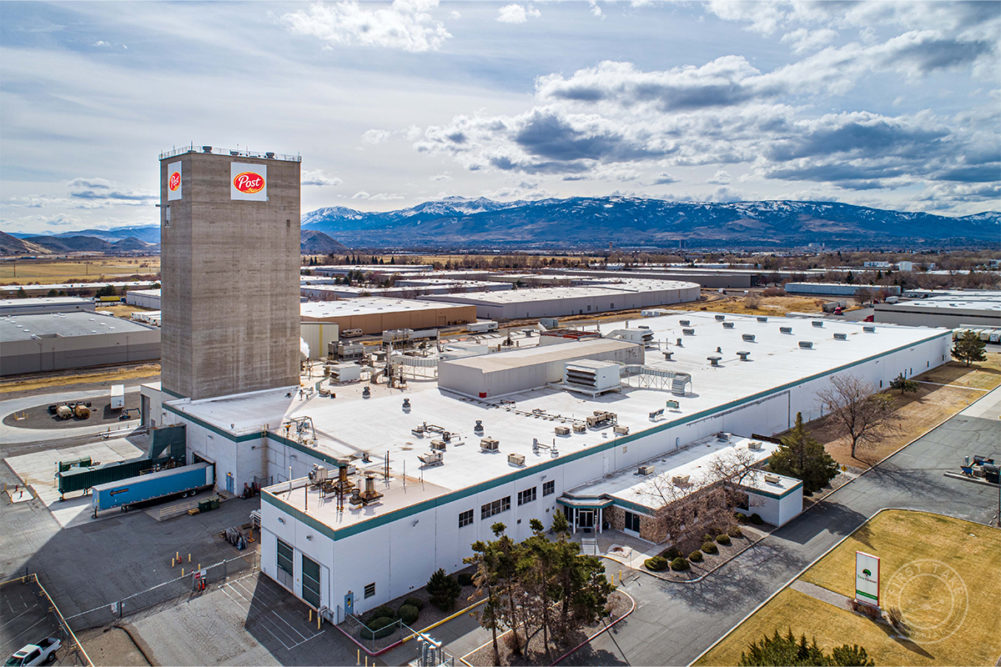ST. LOUIS — Foodservice performance exceeded expectations, leading to stronger results at Post Holdings, Inc. as the company kicked off the fiscal 2023 year.
Net income at Post Holdings in the first quarter ended Dec. 31, 2022, totaled $91.9 million, equal to $1.66 per share on the common stock. This compared with a loss of $208 million in the same period a year ago.
Adjusted earnings from continuing operations, meanwhile, totaled $71.2 million, which compared with a loss of $6 million in the same period a year ago. The most recent quarterly results included a $5.1 million gain on the company’s investment in BellRing, $12.3 in income on swaps, and $10.4 million in debt discounts received.
Net sales in the first quarter increased 17% to $1.57 billion from $1.34 billion.
The strong first-quarter performance prompted Post to raise its full-year fiscal 2023 adjusted EBITDA to $1.025 billion to $1.065 billion, up from an earlier forecast of $900 million to $1.04 billion.
“Post had quite a solid quarter,” Robert V. Vitale, president and chief executive officer, said during a Feb. 3 conference call with analysts. “While all segments performed well, Foodservice performance exceeded expectations and contributed to our outlook revision for the balance of fiscal 2023. Most encouragingly, we are confident that the sustainable EBITDA level for Foodservice has reset to approximately $350 million prior to considering the contribution from our ready-to-drink shake plant that comes online late this year.”
Segment profit in the Post Consumer Brands business totaled $79.3 million, up 11% from $71.3 million a year ago. Net sales rose 9% to $554.7 million from $507.3 million.
“We saw a strong growth in Peter Pan and private label cereal,” said Matthew Mainer, chief financial officer. “These gains were offset by declines in Honey Bunches of Oats, government bid business and MOM bags. Adjusted EBITDA increased 5% versus prior year as our pricing actions outweighed significant cost inflation and higher manufacturing expenses.”
Adding further color on the cereal business, Mr. Vitale noted that the company saw some price gaps between private label and MOM brands that needed to be fixed.
“Those have since been fixed, and you should expect to see some correction of that dynamic going forward,” he said. “The other dynamic is simply the MOM bag, while on a per ounce price point is quite attractive, has a steeper per entry price. So we’re seeing a bit of a migration more toward opening price point levels. But I would expect as we go throughout the balance of the year, you see some of that dynamic with MOM brands start to reverse.”
Post noted substantial strength in its Foodservice unit, which saw segment profit soar 423% to $79.1 million from $15.1 million in the same period a year ago. Net sales in the segment improved to $600.5 million, up 37% from $438.6 million a year ago.
“Revenue growth continued to outpace volume growth as revenue reflects the impact of inflation-driven pricing actions, the effect of our commodity pass-through pricing model and avian influenza-driven pricing actions to offset higher cost to procure eggs on the spot market,” Mr. Mainer said. “Segment adjusted EBITDA grew to $109 million, benefiting from improved average net pricing and volume growth, which combined mitigated the impact of higher cost to produce.”
Segment profit in the Weetabix business was $21.5 million, down 21% from $27.2 million from a year ago. Sales were virtually flat, easing to $118.1 million from $118.6 million.
Mr. Mainer said sales in the Weetabix segment benefited from significant list price increases and contribution from the April 2022 acquisition of the UNFIT brand.
In the Refrigerated Retail segment, profit climbed 54% to $21 million from $13.6 million, while sales rose 7% to $293 million.
Mr. Vitale said Post is beginning to see some expansion of private label distribution in the refrigerated retail category. Because Post does not make private label brands for the segment he said it will need to lean into heavier brand investment to support both expanded distribution and velocities.
“Our first levers would be more traditional continued innovation, continued revisions of pack sizes and expanded advertising, all of which we think the brand would warrant irrespective of the presence of private label,” he said. “Private label has been tried a number of times in the category and not worked. We've been quite successful in managing that.
“We are highlighting it because we're in a bit of a different environment than we've ever been in this category with inflation as widespread as it is. So we would expect to be successful in managing that incremental competition, but we wanted to highlight it because it is relatively new.”
Looking ahead, Post said it expects fiscal 2023 capital expenditures to range between $275 million to $300 million, which includes $75 million to $85 million related to investments in ready-to-drink shake manufacturing and precooked and cage-free eggs.




